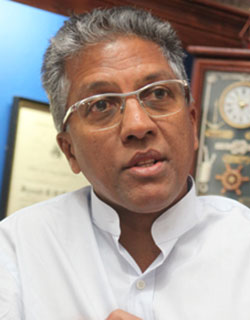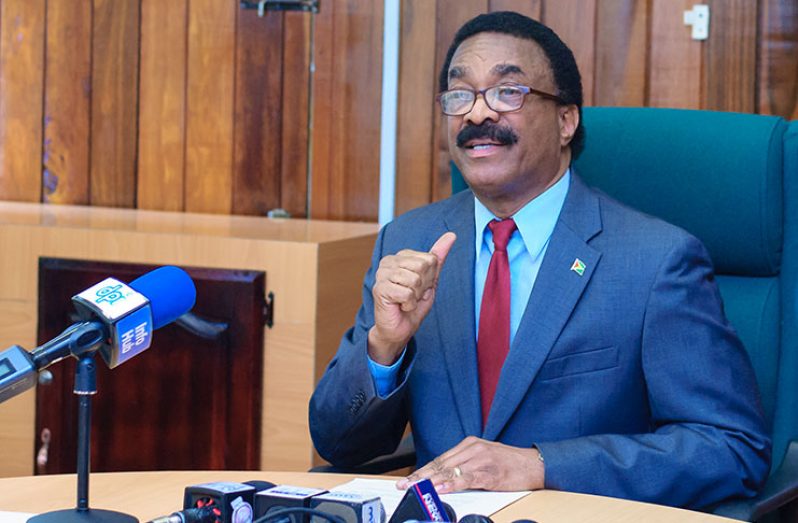…over handling of Guyana’s push for law school
ATTORNEY General, Basil Williams has expressed disquiet over the manner in which Chairman of the Council of Legal Education (CLE), Reginald Armour has been handling Guyana’s move to open its own law school and has threatened that this country may soon take the issue to the Caricom Heads of Government.

Guyana moving ahead with the school has hit a snag with Armour reportedly saying that no permission was given to this country to have its own institution. But Williams has disputed this contention while making it clear that should Armour continue to interfere in the matter, it is likely that Guyana would resort to taking the issue to the CARICOM heads. “If this chairman continues to act in the manner in which he is acting, against the interest of Guyana, we would have to take the matter to the CARICOM heads again.
I am not sure Guyana would be comfortable with such a person remaining in office to chair this organisation,” Williams threatened during a news conference at his office on Monday.
Williams himself early December had announced that a Review Committee of the CLE has agreed that the Council should defer the establishment of new law schools; a move he believes is as a result of the opposition People’s Progressive Party (PPP) intention to sabotage Guyana’s efforts to establish its own law school.
The AG said Armour, of Trinidad and Tobago, relied on a report of a Review Committee which included former Chancellor Carl Singh, to say that the CLE never gave permission to Guyana to establish its own Law School. Justice Carl Singh, former acting Chancellor of the Judiciary here, was the only Head of Judiciary on the Review Committee established in 2009 and was allowed to continue to serve on it by the new Chairman, until his removal was requested, as he had retired from that office at the last CLE Council Meeting held in Trinidad and Tobago from September 7 to 9, 2017. Justice Singh has since denied any involvement in any meeting.
Williams contends that the Review Committee which was set up for a different purpose, suddenly reopened a decision of a Council Meeting in Antigua in September 2016, chaired by previous Chairman, Jacqueline Samuels-Brown S.C., of Jamaica, who concluded after considering several documents, including an unauthorised letter of inquiry by one Trevor Hamilton of Jamaica, that some “determination had been made”; that is, granting Guyana permission to establish a Law School.
The Review Committee comprised the Principals of the three Law Schools under the CLE: a Senior Counsel from Barbados; former Chancellor Carl Singh, and the new Chairman.
Guyana’s delegation at the September, 2016 meeting of the CLE in Antigua included Madam Yonette Cummings-Edwards, Chancellor (ag); President of the Bar Association, Ms. Gem Sandford-Johnson; Secretary of the said Bar, Ms. Excellence Dazzell and AG Williams S.C.
It is as a result of the decision of the Council that Guyana entered into the MoU with the University College of the Caribbean (UCC) and the Law College of the Americas (LCA) last January.
The MoU provides for a feasibility study to be undertaken to determine whether the Joint Venture Partners should proceed to execute the establishment of the Joseph Haynes Law School (JHLS) here.
In light of this, Guyana and its partners pursued the feasibility study and made a request to Chairman Armour to provide Guyana formally with the criteria to operate the local law school. This was not done.
The Executive Council’s CLE will be meeting in Guyana sometime in September and the matter is likely to be raised and discussed then.
Strange actions
Williams described Armour’s actions as “strange” noting that he never afforded Guyana a hearing on the matter. “He never disclosed to me that the reason he put the item on the agenda is at the behest of Mr Nandlall. We have emails which he wrote to (Anil) Nandlall, thanking him and saying he will put it on his agenda. He engages the opposition without consulting the sitting Attorney General and fixes the matter on the agenda without asking my permission first,” Williams stated Monday.
The Attorney General said he is unsure of Armour’s motives but believes he is acting in a manner contrary to a person who is the custodian of the organisation he heads. “The action of this person is unheard of in an international public service situation…and we are wondering whether it would be in our interest for the person to continue…The agenda is set by sitting members, people in government, not people in opposition. Secondly, the review committee can’t make no decision to overrule a council decision,” he declared.
Additionally, Williams said that in the past Guyanese law students suffered and nothing was done to alleviate their suffering. He explained that approximately 200 law students are churned out annually from Jamaica and Trinidad while Guyana only has the opportunity to send 25 students. “Our first year, we had to ask the president who was at CARICOM heads meeting to put the issue on the agenda and that is where the heads of government decided that the Guyanese law students must be admitted,” Williams reminded.
Demarcating land
Meanwhile, Williams said the establishment of the school is still on the cards, assuring reporters that efforts are continuing to ensure that the school is established. In fact, he disclosed that he has since written Vice Chancellor of the University of Guyana (UG), Professor Dr. Ivelaw Lloyd Griffith to facilitate the demarcation of lands at the Turkeyen Campus to house the law school. “We are working for the school,” he assured. He told reporters that the feasibility study, though incomplete, is going well.
“The thing we are waiting for now is to get the land demarcated and I have written the Vice-Chancellor Dr Griffith… [who] asked the Deputy Vice- Chancellor, Dr Barbara Reynolds, to facilitate the demarcation of the land on the campus.” “We have started far apart but we are very close now. Once we have the land, we will try to move ahead to alleviate the sufferings of the law students,” he assured.
Williams, in January 2017, had announced the launch of the project for the establishment of the JOF Haynes Law School. The project comes after some two decades of lobbying for an alternative to the Norman Manley Law School in Jamaica, the Hugh Wooding Law School in Trinidad and Tobago and the Eugene Dupuch Law School in The Bahamas.
The JOF Haynes Law School is being established through a Public-Private Partnership between the Government of Guyana, the Law School of the Americas (LCA) and the University College of the Caribbean (UCC) and will add to the existing options available to holders of a Bachelor of Laws degree (LLB), and who intend to pursue their Legal Education Certificate (LEC).
A timeline of 2018 was set for the establishment of the local institution. Guyanese students are faced with hefty sums they have to pay and along with the small quota of students accepted into the Hugh Wooding Law School, are of concern to his administration.
Permission



.jpg)








